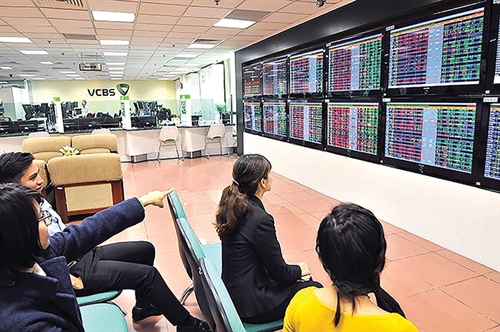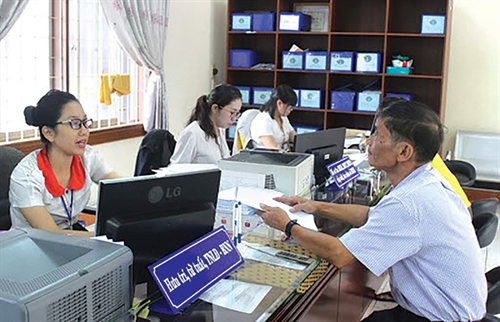Investors would be allowed to perform secured short sale and intraday transactions in the near future when technical conditions permit.
Such is one of the Ministry of Finance (MOF)’s proposals in a draft circular to replace Circular 203 of 2015 regarding transactions in the stock market, which are expected to robust the stock market, attract investors and trigger a surge in trading turnover and liquidity.
 |
| Vietcombank Securities Company Ltd.’s trading floor__Photo: Internet |
To make it clear, the draft introduces a specific definition of secured short sale transaction, i.e., the transaction of selling securities borrowed from the securities borrowing and lending system of the Vietnam Securities Depository; the seller is then obliged to buy back these securities volume to return the borrowed securities volume.
In order to make secured short sale transactions, an investor would have to open a secured short sale account at a securities firm licensed to provide securities lending services where his main trading account is managed. The secured short sale account may be either a separate account or a sub-account of the investor’s main account but must be separated from the main account.
Securities permitted for secured short sale transactions include stocks and fund certificates listed and registered for trading on stock exchanges and meeting several criteria set by the State Securities Commission (SSC) regarding the listing time and trading registration; size of capital and business results of the issuing organization; liquidity and price volatility (if any); and information transparency, among others.
On the basis of the SSC’s criteria, stock exchanges would announce the list of securities qualified or disqualified for secured short sale.
A securities lending contract must at least comprise information on the collateral, lending interest, lending term, extension of the securities lending period, method of handling the collateral in case the investor fails to return the lent securities volume, and dispute resolution method. The contract must also state potential risks and losses as well as arising expenses.
Another important regulation proposed in the draft is the intraday trading mechanism (T+0). Accordingly, investors could purchase and sell securities of the same code with the same volume on the same account within a single trading day, instead of having to wait for three days as at present.
Similarly to short selling transactions, investors wishing to perform intraday trading must sign intraday trading contracts with securities firms licensed to provide securities lending services. Notably, such a contract must contain a term permitting the securities company to conduct mandatory lending or buying transactions to support liquidity when necessary.
Stocks eligible for intraday trading would be picked up by securities firms and posted on their websites.
To conduct intraday transactions, investors would place orders provided that the aggregated volume of stocks on buying orders is equal to the aggregated volume of securities of the same code on selling order and vice versa. If there is any disparity, securities firms would, on behalf of investors, make up the deficit money amount or securities volume; in this case, investors would pay all arising expenses and damages, if any, to the securities firms. Besides, securities firms might ask investors to deposit a money amount or securities volume before allowing investors to perform intraday transactions.
The draft also stipulates that the total value of intraday transactions at each securities firm in a day would neither exceed a specific rate of its equity nor surpass a specific rate of its previous month’s daily average trading value. Meanwhile, the total volume of securities traded under intraday transactions in a day at a securities firm must not exceed a specific rate of the volume of securities in circulation. All these rates would be set by the SSC.
Intraday transactions of a stock would be disallowed in five days prior to the record date of such stock.
In special cases, the SSC might require securities firms to suspend secured short sale and intraday transactions to ensure safety for the securities market.
Worthy of note, the draft adds a new tool for controlling the stock market - market-wide circuit breaker, which is used to automatically halt transactions in a trading session when the price of a stock or stock index fluctuates and reaches a threshold set on stock trading systems of stock exchanges.
Stock exchanges could trigger the market-wide circuit breaker after receiving the SSC’s approval. Meanwhile, the SSC would base on practical market conditions to decide to apply either the market-wide circuit breaker or price fluctuation amplitude mechanism or both of them.
Also in the draft, the MOF for the first time proposes allowing individual investors aged between 15 years and under 18 years and having full civil act capacity to open securities accounts, provided their at-law representatives so agree.
An investor would be allowed to hold multiple accounts but may open one trading account and one margin account at each securities company. Foreign investors must register securities trading codes with the Vietnam Securities Depository.- (VLLF)









